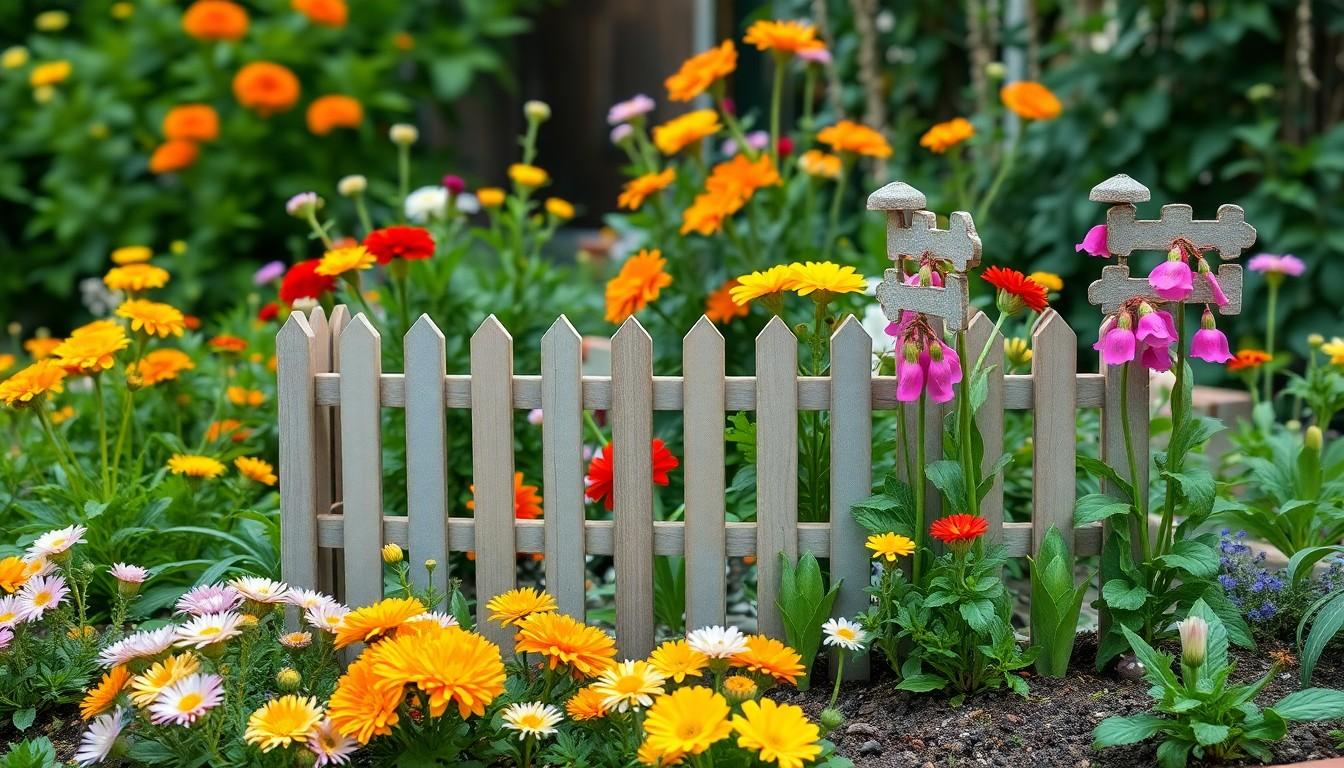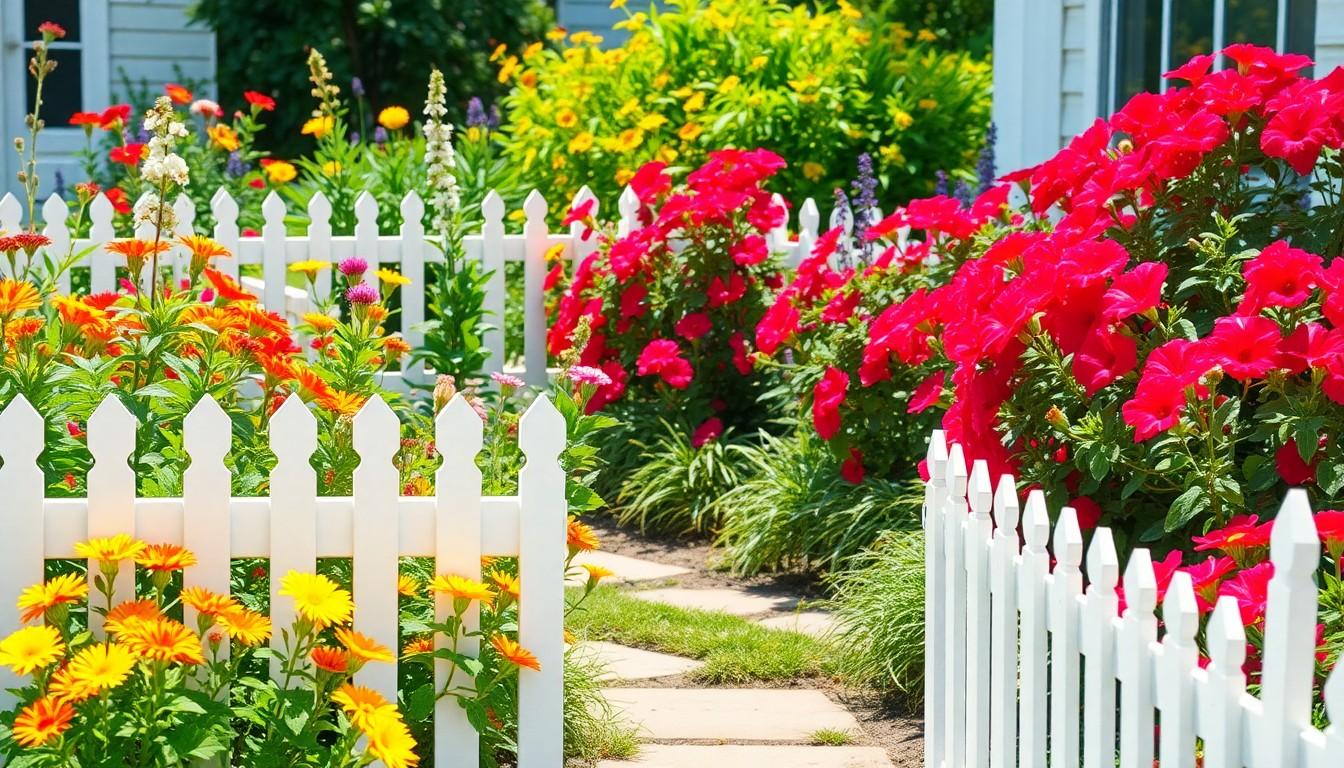Every garden deserves a little flair, and what better way to add charm than with a small fence? Imagine a quaint picket fence framing your blooming flowers or a sleek modern design highlighting your veggies. A small fence isn’t just a barrier; it’s a statement piece that says, “I take my gardening seriously, but I also know how to have fun!”
Overview of Small Fence for Garden
Small fences for gardens come in various styles and materials, including wood, vinyl, and metal. Choosing the right option influences the overall aesthetic and functionality. A wooden picket fence offers a classic, charming feel, while a wrought iron fence introduces an elegant touch.
Different sizes of small fences cater to various garden layouts. For example, a fence standing at 3 feet tall can effectively define a space without obstructing the view. Conversely, a taller option may serve as a more substantial barrier against animals.
Functionality remains a key aspect of any garden fence. Small fences help keep pets and children safe while adding definition to garden boundaries. They can also protect delicate plants from wind damage or provide shade to sun-sensitive varieties.
Adding a small fence creates opportunities for creativity with planting. Vertical gardens enhance limited spaces, and trellises can support climbing plants. These combinations not only beautify the garden but also promote biodiversity by attracting beneficial insects.
Selecting materials requires consideration of maintenance. Vinyl fences require less upkeep than wooden ones, which may need regular staining or painting. Assessing local climate can guide choices toward materials best suited to endure specific weather conditions.
Small fences offer practical solutions and aesthetic enhancements for gardens. Their presence reflects a gardener’s style and commitment to creating a pleasant environment. For anyone considering a small fence, exploring different types and their benefits opens the door to a more beautiful and functional garden space.
Benefits of Installing a Small Fence

Small fences offer numerous advantages for garden spaces. These benefits range from enhancing aesthetic appeal to increasing security and privacy.
Aesthetic Appeal
Enhancing visual interest, a small fence contributes to the overall charm of a garden. Different styles, like picket or modern designs, allow for personal expression. Colors and materials further elevate a garden’s look, creating a focal point or complementing existing elements. Incorporating a fence adds structure without overwhelming the landscape. It frames garden beds and pathways, guiding the eye through the space. Unique materials, such as vinyl or wood, provide varied textures that enhance the garden’s character.
Security and Privacy
Establishing clear boundaries, a small fence provides security and privacy. By keeping pets contained, it prevents unwanted escapes and protects garden plants from damage. Additionally, the fence acts as a deterrent against wildlife looking for an easy snack. Heightened privacy offers peace of mind, especially in urban settings. A small fence can reduce noise intrusion, creating a quiet retreat atmosphere. When combined with strategic plantings, it further obscures views, enhancing the sense of seclusion in outdoor spaces.
Types of Small Fences Available
Small fences come in various types, each offering unique benefits and styles that enhance garden spaces. Understanding these options helps in making an informed choice.
Wooden Fences
Wooden fences create a classic look and provide natural charm to a garden. These fences often come in styles such as picket, panel, or lattice. Cedar and pine are common wood types, selected for their durability and resistance to decay. Wooden fences can be painted or stained, allowing customization to fit personal aesthetics. Proper maintenance, including periodic sealing and painting, prolongs their life. They also offer some flexibility in height, which can accommodate different garden layouts and purposes.
Vinyl Fences
Vinyl fences offer a low-maintenance alternative to wood. Made from PVC, these fences resist fading, cracking, and warping. They come in various colors and styles, simulating the look of traditional wood without the upkeep. Installation is often straightforward, as they connect through a series of posts and brackets. Vinyl fencing remains an excellent choice for gardens needing a clean, modern appearance. Its resistance to weather elements ensures that it retains its beauty over time, making it a practical option for busy gardeners.
Metal Fences
Metal fences provide strength and security, making them a popular choice for gardens. Options include wrought iron, aluminum, and chain link, each offering distinct benefits. Wrought iron provides a classic, elegant appearance, often seen as ornamental. Aluminum is lightweight yet durable, making installation easier. Chain link fences, while more utilitarian, offer high visibility without obstructing views. Metal fences typically require minimal maintenance, needing occasional painting or cleaning to prevent rust. Suitable for various garden designs, they effectively deter animals while adding a touch of sophistication.
Factors to Consider When Choosing a Small Fence
Selecting the right small fence for a garden involves several key factors. Each aspect contributes to the overall appeal and functionality of the space.
Size and Height
Size and height of a small fence play critical roles in defining a garden’s boundaries and style. A 3-foot tall fence offers enough separation without obstructing views, creating an open feel. Taller options might be necessary to deter wildlife or limit visibility from the street. Assess garden dimensions before choosing, as fitting the scale enhances visual harmony. Properties with slopes or uneven ground may require varying heights to maintain consistency throughout.
Material Durability
Material durability impacts the long-term enjoyment of a small fence. Wooden fences deliver a classic aesthetic but require more maintenance to prevent rot. Vinyl fences resist fading and warping, ensuring a longer lifespan with minimal upkeep. Metal options, like wrought iron or aluminum, add strength and security while needing only occasional cleaning. Consider local climate conditions when selecting materials; for instance, humid environments may warrant resistant options to combat moisture. Long-lasting materials contribute to a sustainable garden design.
Budget Considerations
Budget considerations heavily influence choices regarding a small fence. Wooden fencing typically presents a more affordable upfront cost, while vinyl and metal options often require a higher initial investment. Long-term expenses must factor in maintenance; for example, wooden fences may incur costs for staining or painting over time. Evaluate the entire lifecycle cost of each choice, including installation and repair, to determine the best fit for any financial plan. Thoughtful budgeting maximizes both beauty and functionality without overspending.
Conclusion
A small fence can truly transform a garden into a charming and functional space. By carefully selecting the right style and material, gardeners can enhance their outdoor areas while ensuring safety and privacy. The versatility of small fences allows for creative expression and effective boundary definition, making them a valuable addition to any garden.
Whether opting for the classic appeal of wood, the low-maintenance benefits of vinyl, or the durability of metal, each choice offers unique advantages. Ultimately, a small fence not only beautifies the garden but also reflects the gardener’s dedication to creating an inviting and secure environment. Embracing this element can lead to a more enjoyable gardening experience and a stunning outdoor retreat.

